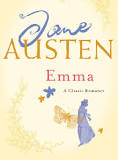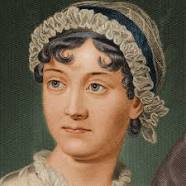Emma Page #4
Emma, by Jane Austen, is a novel about youthful hubris and the perils of misconstrued romance. The story takes place in the fictional village of Highbury and the surrounding estates of Hartfield, Randalls, and Donwell Abbey and involves the relationships among individuals in those locations consisting of "3 or 4 families in a country village". The novel was first published in December 1815 while the author was alive, with its title page listing a publication date of 1816. As in her other novels, Austen explores the concerns and difficulties of genteel women living in Georgian–Regency England; she also creates a lively comedy of manners among her characters and depicts issues of marriage, gender, age, and social status.
It was now some time since Miss Taylor had begun to influence his schemes; but as it was not the tyrannic influence of youth on youth, it had not shaken his determination of never settling till he could purchase Randalls, and the sale of Randalls was long looked forward to; but he had gone steadily on, with these objects in view, till they were accomplished. He had made his fortune, bought his house, and obtained his wife; and was beginning a new period of existence, with every probability of greater happiness than in any yet passed through. He had never been an unhappy man; his own temper had secured him from that, even in his first marriage; but his second must shew him how delightful a well-judging and truly amiable woman could be, and must give him the pleasantest proof of its being a great deal better to choose than to be chosen, to excite gratitude than to feel it. He had only himself to please in his choice: his fortune was his own; for as to Frank, it was more than being tacitly brought up as his uncle's heir, it had become so avowed an adoption as to have him assume the name of Churchill on coming of age. It was most unlikely, therefore, that he should ever want his father's assistance. His father had no apprehension of it. The aunt was a capricious woman, and governed her husband entirely; but it was not in Mr. Weston's nature to imagine that any caprice could be strong enough to affect one so dear, and, as he believed, so deservedly dear. He saw his son every year in London, and was proud of him; and his fond report of him as a very fine young man had made Highbury feel a sort of pride in him too. He was looked on as sufficiently belonging to the place to make his merits and prospects a kind of common concern. Mr. Frank Churchill was one of the boasts of Highbury, and a lively curiosity to see him prevailed, though the compliment was so little returned that he had never been there in his life. His coming to visit his father had been often talked of but never achieved. Now, upon his father's marriage, it was very generally proposed, as a most proper attention, that the visit should take place. There was not a dissentient voice on the subject, either when Mrs. Perry drank tea with Mrs. and Miss Bates, or when Mrs. and Miss Bates returned the visit. Now was the time for Mr. Frank Churchill to come among them; and the hope strengthened when it was understood that he had written to his new mother on the occasion. For a few days, every morning visit in Highbury included some mention of the handsome letter Mrs. Weston had received. “I suppose you have heard of the handsome letter Mr. Frank Churchill has written to Mrs. Weston? I understand it was a very handsome letter, indeed. Mr. Woodhouse told me of it. Mr. Woodhouse saw the letter, and he says he never saw such a handsome letter in his life.” It was, indeed, a highly prized letter. Mrs. Weston had, of course, formed a very favourable idea of the young man; and such a pleasing attention was an irresistible proof of his great good sense, and a most welcome addition to every source and every expression of congratulation which her marriage had already secured. She felt herself a most fortunate woman; and she had lived long enough to know how fortunate she might well be thought, where the only regret was for a partial separation from friends whose friendship for her had never cooled, and who could ill bear to part with her. She knew that at times she must be missed; and could not think, without pain, of Emma's losing a single pleasure, or suffering an hour's ennui, from the want of her companionableness: but dear Emma was of no feeble character; she was more equal to her situation than most girls would have been, and had sense, and energy, and spirits that might be hoped would bear her well and happily through its little difficulties and privations. And then there was such comfort in the very easy distance of Randalls from Hartfield, so convenient for even solitary female walking, and in Mr. Weston's disposition and circumstances, which would make the approaching season no hindrance to their spending half the evenings in the week together. Her situation was altogether the subject of hours of gratitude to Mrs. Weston, and of moments only of regret; and her satisfaction--her more than satisfaction--her cheerful enjoyment, was so just and so apparent, that Emma, well as she knew her father, was sometimes taken by surprize at his being still able to pity 'poor Miss Taylor,' when they left her at Randalls in the centre of every domestic comfort, or saw her go away in the evening attended by her pleasant husband to a carriage of her own. But never did she go without Mr. Woodhouse's giving a gentle sigh, and saying, “Ah, poor Miss Taylor! She would be very glad to stay.” There was no recovering Miss Taylor--nor much likelihood of ceasing to pity her; but a few weeks brought some alleviation to Mr. Woodhouse. The compliments of his neighbours were over; he was no longer teased by being wished joy of so sorrowful an event; and the wedding-cake, which had been a great distress to him, was all eat up. His own stomach could bear nothing rich, and he could never believe other people to be different from himself. What was unwholesome to him he regarded as unfit for any body; and he had, therefore, earnestly tried to dissuade them from having any wedding-cake at all, and when that proved vain, as earnestly tried to prevent any body's eating it. He had been at the pains of consulting Mr. Perry, the apothecary, on the subject. Mr. Perry was an intelligent, gentlemanlike man, whose frequent visits were one of the comforts of Mr. Woodhouse's life; and upon being applied to, he could not but acknowledge (though it seemed rather against the bias of inclination) that wedding-cake might certainly disagree with many--perhaps with most people, unless taken moderately. With such an opinion, in confirmation of his own, Mr. Woodhouse hoped to influence every visitor of the newly married pair; but still the cake was eaten; and there was no rest for his benevolent nerves till it was all gone. There was a strange rumour in Highbury of all the little Perrys being seen with a slice of Mrs. Weston's wedding-cake in their hands: but Mr. Woodhouse would never believe it. CHAPTER III Mr. Woodhouse was fond of society in his own way. He liked very much to have his friends come and see him; and from various united causes, from his long residence at Hartfield, and his good nature, from his fortune, his house, and his daughter, he could command the visits of his own little circle, in a great measure, as he liked. He had not much intercourse with any families beyond that circle; his horror of late hours, and large dinner-parties, made him unfit for any acquaintance but such as would visit him on his own terms. Fortunately for him, Highbury, including Randalls in the same parish, and Donwell Abbey in the parish adjoining, the seat of Mr. Knightley, comprehended many such. Not unfrequently, through Emma's persuasion, he had some of the chosen and the best to dine with him: but evening parties were what he preferred; and, unless he fancied himself at any time unequal to company, there was scarcely an evening in the week in which Emma could not make up a card-table for him.
Translation
Translate and read this book in other languages:
Select another language:
- - Select -
- 简体中文 (Chinese - Simplified)
- 繁體中文 (Chinese - Traditional)
- Español (Spanish)
- Esperanto (Esperanto)
- 日本語 (Japanese)
- Português (Portuguese)
- Deutsch (German)
- العربية (Arabic)
- Français (French)
- Русский (Russian)
- ಕನ್ನಡ (Kannada)
- 한국어 (Korean)
- עברית (Hebrew)
- Gaeilge (Irish)
- Українська (Ukrainian)
- اردو (Urdu)
- Magyar (Hungarian)
- मानक हिन्दी (Hindi)
- Indonesia (Indonesian)
- Italiano (Italian)
- தமிழ் (Tamil)
- Türkçe (Turkish)
- తెలుగు (Telugu)
- ภาษาไทย (Thai)
- Tiếng Việt (Vietnamese)
- Čeština (Czech)
- Polski (Polish)
- Bahasa Indonesia (Indonesian)
- Românește (Romanian)
- Nederlands (Dutch)
- Ελληνικά (Greek)
- Latinum (Latin)
- Svenska (Swedish)
- Dansk (Danish)
- Suomi (Finnish)
- فارسی (Persian)
- ייִדיש (Yiddish)
- հայերեն (Armenian)
- Norsk (Norwegian)
- English (English)
Citation
Use the citation below to add this book to your bibliography:
Style:MLAChicagoAPA
"Emma Books." Literature.com. STANDS4 LLC, 2025. Web. 23 Feb. 2025. <https://www.literature.com/book/emma_29>.








Discuss this Emma book with the community:
Report Comment
We're doing our best to make sure our content is useful, accurate and safe.
If by any chance you spot an inappropriate comment while navigating through our website please use this form to let us know, and we'll take care of it shortly.
Attachment
You need to be logged in to favorite.
Log In